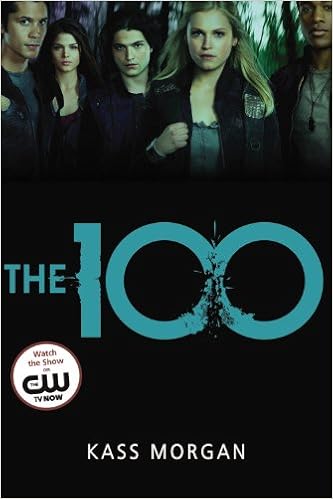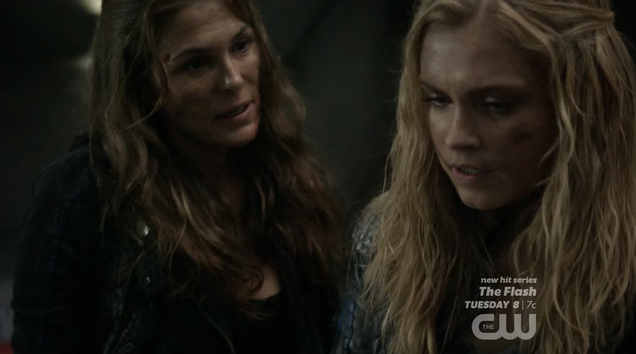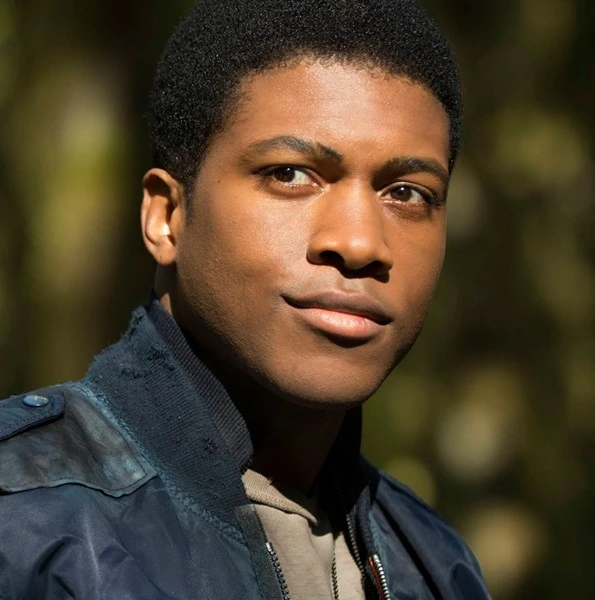
*This review will contain spoilers!*
I normally make sure to read the books before I watch the TV or film adaptations, but because I didn't realise 'The 100' was a book I've done it the wrong way around this time. This meant that throughout most of the book I found myself mentally comparing it to the TV show. I'm going to try to review the book by itself, then do a little comparison to the TV show at the bottom: if you're a huge fan of the show and are not sure whether to read the book, you should scroll down to that bit.
'The 100' has an extremely interesting premise; the Earth has been evacuated because of a nuclear winter, so the remnants of humanity are living in the Colony - a huge spaceship comprised of Walden, Arcadia and Phoenix. Phoenix is the rich area of the Colony, while Arcadia and Walden are lower class areas inhabited by workers. The Colony has been in existence for over three hundred years, but with problems starting to occur it's decided that the first batch of people are going to be sent back to Earth - one hundred underage criminals.
There are four viewpoints throughout 'The 100': those of Clarke, Bellamy, Wells and Glass. Clarke was the daughter of two scientists who had been performing illegal radiation experiments on orphans on the ship. Bellamy is half of the only set of siblings in the universe, his sister, Octavia, being one of the one hundred. Wells is son of the Chancellor of the Colony, but is madly in love with Clarke. Glass is Wells' best friend, a young girl who made a mistake and sacrificed her freedom to save the boy that she loved.
Because there are four narrators, it often feels like there's a lot of jumping all over the place. Glass escapes off of the dropship and this makes her viewpoint the most unique of the four - while Bellamy, Wells and Clarke are all off exploring Earth, Glass is the only one learning how to survive as a newly free woman in Phoenix. This doesn't make Glass's perspective the most interesting: in fact, because her story focuses upon her rebuilding her relationship with her ex-boyfriend, Luke, it gets quite boring at times throughout.
Clarke and Bellamy are the more interesting of the characters. Wells seems to complain a hell of a lot and he has quite a superiority complex (even though he protests it when people imply that he does), and he's one of the most selfish characters I've ever experienced in YA. Contrasting to this, Bellamy risks everything to fight his way on to the dropship to go to Earth with Octavia, and Clarke was a medical intern before she got arrested so she takes all responsibility for caring for the one hundred upon herself. Due to the violence of the dropship landing Clarke's best friend, Thalia, gets terribly injured, and Clarke does everything in her power to help heal her, despite the fact that the medication supplies were thrown from the ship as it plummeted to Earth.
However, even Clarke wasn't completely faultless. Her and Wells had a history on the Colony, until he exposed her parents illegal experiments and got them executed, so as you can imagine there is a lot of tension between their characters. Due to this, whenever Wells upsets Clarke she runs straight into the arms of Bellamy, and I feel extremely sorry for him because he grows to care for her and it seems as though she's only using him.
Bellamy was definitely the only character I didn't despise in some way, shape or form. Doing everything he can for his sister, his loyalty and compassion to his family is adorable, making him the most likable member of the hundred by far. After hearing about the Earth mission, Bellamy did a lot of research to learn survival skills, so he ends up being the only one that can hunt and feed the camp, making him pretty damn indispensable. There's a lot of Bellamy's back story that is only eluded to - he mentions the fact that Clarke is one of the only girls he's ever liked, and the other one ended horribly - so I'm sure we're going to learn more about him in the coming novels, and I'm excited about that prospect.
In all honesty, not much happens in this book. It can't really be called a dystopian novel, because it's more survivalist, but it takes a very long time for the characters to adjust to being on Earth so there isn't much surviving done. Bellamy goes hunting frequently, and Clarke eventually gets the medicine and starts trying to cure people, but other than that there is a lot of milling around camp aimlessly. The last fifty pages get majorly exciting: the hundred come to the realisation that there are more people on Earth, and the ending of the novel is highly climactic, leaving your heart in your throat on the last page and making it impossible not to pick up the second novel. However, I do think that's the only reason that people would bother continuing on with the series.
Don't get me wrong, the idea is extremely unique and interesting, but the execution is not that brilliant. The constant switching between viewpoints is rather irritating - it might be more effective if it was only switching between Glass and Clarke, to show two similar girls in extremely dissimilar situations, because I still think we'd get the story developments from Bellamy and Wells through Clarke. Furthermore, the constant use of flashbacks to show back story does get draining, but it makes it very easy to see why they would have decided to adapt the book into a TV show - it's already highly cinematographic in its construction. I'm just glad they used a different font for the flashback sequences, because sometimes the transitions into and out of the past events are rather sharp and unexpected.
But at a base level it just seemed like a lot of something out of nothing. The struggles that the hundred face are all solved extremely easily - Octavia steals medication and admits it rather quickly, there's a fire that only takes out one member of the group, and Clarke gets lost and falls through a decaying wooden balcony only for Wells to swoop in and save her, neither of them getting injuries. It might have been better if the novel was longer, but it felt rushed - the friction between Wells, Bellamy and the group dissenter Graham could have been very well developed, but it just seemed flat and undeveloped, the same of which can be said for most of the minor characters and incidents that occur.
I'm hoping that with the introduction of the Grounders (or whatever they're called in the novels) at the end of the book will lead to a lot of exciting events throughout the next novel, 'Day 21', as long as they aren't rushed and resolved within the first hundred pages or so.
The top five main differences between the book and the TV show:
5) Both of Clarke's parents are dead

There's going to be no emotional scenes of Clarke's mom attempting to get to Earth to reunite with her, because when Clarke's parents are executed both of them are killed. I think this could make for interesting dynamics later on - Clarke will have no reason to want to reunite with the members of the Colony, so if/when they all come to Earth I think her reaction will be extremely different.
4) Wells isn't dead... yet

Wells was a majorly under used character in the TV show, so it's great to see him being more developed in the novels. I will admit, the fact that he risked the lives of the entire human population to save the life of his girlfriend is BEYOND RIDICULOUS AND SELFISH. I'm so angry with him because of that; he acts like a very level-headed and competent leader, but knowing that he was so childish over a girl is unbelievable. It's going to take a lot for him to redeem himself in my eyes.
3) Glass is a character
I'm very surprised that Glass's character wasn't brought into the TV show; she seems to be one of the more grown-up YA characters, and I really appreciate the fact that she seems to sacrifice herself constantly to save the people that she loves. I guess she wasn't really needed because there was already a lot of jumping back to the Colony in the show (using Clarke's non-existent mum) but I'm enjoying her character in the book anyway.
2) Finn doesn't exist... and neither does Murphy?

Considering the fact that Finn is pictured on the front cover of the novel, you'd imagine that he would be one of the main characters in the book, but (at this point, at least) he doesn't exist. I'm kind of glad he doesn't - if there was another addition to the Clarke/Bellamy/Wells love triangle I think I would shoot myself. But I am more surprised about the fact that Murphy doesn't exist, because he's such a well-rounded and extremely psychopathic but lovable character in the show. He's probably one of my favourites. At the moment, I'm seeing some links between Murphy's character and the character of Graham in the novels - they both seem to cause trouble and dissent with the majority opinion, but nothing of note has happened to Graham so I'm not sure if it is the same character at the moment...
1) There's a lot less death
While in the TV show the number was dropping like flies (I think we were down to under eighty by the end of the first season) at the moment there are still over ninety of the hundred left, so the survival rate seems to be pretty high at the moment. I'm sure it's going to get more gruesome and bloody over the next two novels, but at the moment it's a heck of a lot tamer - if you're a fan of the show but wish there were less deaths, I'd definitely recommend the novel to you.
At the moment, I'm not really sure how I'm feeling about this book. It's a lot different to what I was expecting, and with the TV show being one of my favourites of all time I guess I had my hopes up much too highly. This book wasn't terrible, but it also didn't blow me away - I feel very neutral towards it. I am excited about what's going to happen in the next book, because the cliffhangers for all four characters were very well written and captivating; I'm just not sure whether to wait for a while to get my excitement level built up again.

No comments:
Post a Comment